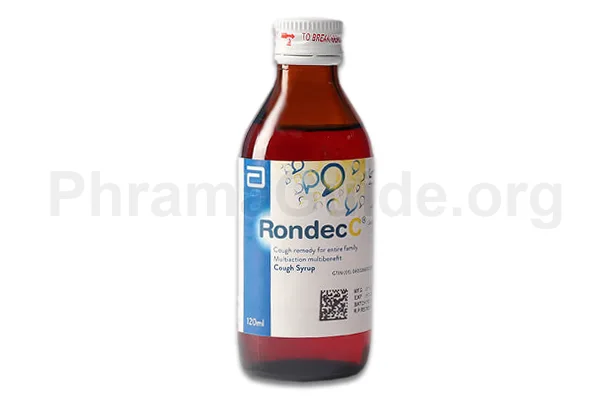Rondec-C syrup is a combination medication that is primarily used for the relief of symptoms associated with respiratory allergies and the common cold. The following are some common uses and indications of Rondec-C Syrup:
- Allergic Rhinitis: Rondec C syrup is used to relieve symptoms of allergic rhinitides, such as sneezing, itching, runny or stuffy nose, and watery eyes caused by allergies to substances like pollen, dust mites, or pet dander.
- Nasal Congestion: The decongestant component of Rondec C syrup, helps reduce nasal congestion by constricting the blood vessels in the nasal passages, allowing for easier breathing.
- Cough: Rondec C syrup is also used as a cough suppressant. It helps alleviate coughing associated with respiratory conditions like the common cold or bronchitis.
Off-label Uses of Rondec-C Syrup
- To Relieve the Symptoms of Asthma: Although Rondec-C syrup is used off-label for asthma, it may help to relieve some of the symptoms, such as wheezing and shortness of breath.
- To Relieve the Symptoms of Bronchitis: Bronchitis is an inflammation of the bronchi, the tubes that carry air to and from the lungs. Rondec-C syrup may help to loosen mucus and make it easier to cough up, which can help relieve some of the symptoms of bronchitis.
- To Relieve the Symptoms of Sinusitis: Sinusitis is an inflammation of the sinuses, the air-filled cavities in the bones of the face. Rondec-C syrup may be used off-label to relieve the symptoms of sinusitis, such as congestion, pain, and pressure.

What is Rondec-C?
Rondec-C Syrup is a combination of Dextromethorphan, Carbinoxamine, Pseudoephedrine, and Guaifenesin, manufactured and marketed by Abbott Laboratories Pakistan (Pvt) Ltd.
Rodec-C Alternatives : Other Similar Brands
The following are some other syrups that can be used as an alternative to Rodec-C Syrup.
Rondec-C : Available Formulations and Strengths
Presently, Rondec-C is available in 120ml syrup form.
Each 5ml of Rondec-C Syrup Contains:
- Dextromethorphan HBr: 7.5 mg
- Carbinoxamine Maleate: 1.25 mg
- Pseudoephedrine HCl: 30 mg
- Guaifenesin: 50 mg
Who Should Not Use Rondec-C?
Here are some common contraindications associated with Rondec-C syrup:
- Hypersensitivity: Individuals who have a known allergy or hypersensitivity to chlorpheniramine, phenylephrine, methscopolamine, or any other ingredients in the syrup should not use Rondec-C. Allergic reactions can range from mild skin rashes to severe reactions, including difficulty breathing or anaphylaxis.
- Severe Hypertension: Rondec-C syrup contains phenylephrine, which is a decongestant that can raise blood pressure. Therefore, it is contraindicated in individuals with severe hypertension (high blood pressure) or uncontrolled high blood pressure.
- Severe Cardiovascular Disease: The use of Rondec-C syrup is contraindicated in individuals with severe cardiovascular disease, including coronary artery disease, angina, arrhythmias, or other serious heart conditions. Phenylephrine in the syrup can potentially worsen these conditions.
- Closed-Angle Glaucoma: Rondec-C syrup should not be used by individuals with closed-angle glaucoma, a specific type of glaucoma characterized by increased pressure in the eye. The anticholinergic properties of methscopolamine in the syrup can exacerbate this condition.
- Urinary Retention: Rondec-C syrup is contraindicated in individuals with urinary retention or bladder neck obstruction. The anticholinergic effects of methscopolamine can further obstruct urine flow.
- MAO Inhibitors: The use of Rondec-C syrup is contraindicated in individuals taking or who have taken monoamine oxidase (MAO) inhibitors within the past 14 days. Combining Rondec-C with MAO inhibitors can lead to severe interactions and potentially dangerous increases in blood pressure.
Recommended Daily Dosage of Rondec-C Syrup?
Rondec-C Syrup Dose for Adults and Children (12 years and older):
- 5-10 ml (1-2 teaspoons) of syrup every 4-6 hours, up to a maximum of 40 ml (8 teaspoons) in 24 hours.
- It is important to not exceed the recommended daily dose or frequency of administration.
Rondec-C Syrup Dose for Children (6 to 12 years):
- 2.5-5 ml (½-1 teaspoon) of syrup every 4-6 hours, up to a maximum of 20 ml (4 teaspoons) in 24 hours.
How Rondec-C Works?
Here’s a mode of action for each ingredient of Rondec-C syrup:
- Dextromethorphan: Dextromethorphan is a cough suppressant that helps relieve coughing by acting on the cough reflex in the brain. It is commonly used to provide temporary relief from non-productive (dry) coughs.
- Carbinoxamine: Carbinoxamine is an antihistamine that is often used for its anticholinergic and sedating effects. It helps alleviate symptoms associated with allergies, such as sneezing, itching, runny nose, and watery eyes. It may also have a mild cough-suppressing effect.
- Pseudoephedrine: Pseudoephedrine is a decongestant that works by narrowing the blood vessels in the nasal passages, reducing nasal congestion and swelling. It is commonly used to relieve nasal congestion caused by conditions such as the common cold, sinusitis, or allergies.
- Guaifenesin: Guaifenesin is an expectorant that helps loosen thin mucus in the airways, making it easier to cough up. It is used to relieve chest congestion and promote the removal of mucus in conditions such as the common cold, bronchitis, or respiratory tract infections.

Leave A Comment